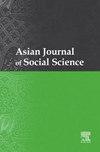“You are the prettiest man I have ever met”: Subverting femininity through jocular teasing of Chinese females
IF 1.2
4区 社会学
Q2 AREA STUDIES
引用次数: 0
Abstract
This paper explores how teasing behaviours assist women in expressing intimacy in daily interactions and therefore create different expectations for gender roles under the Chinese context by analysing 379 instances of jocular teasing taken from a Chinese reality TV show. This study identified five strategies, namely jocular deprecation/self-deprecation, jocular criticism, jocular directives, jocular praise/self-praise, and jocular irony. The results indicate that the women incline to using teasing strategies to discursively index power and masculinity via correcting other's behaviours and maintaining a superior position within the group. Additionally, these women use teasing strategies in various combinations to achieve multi-layered communicative goals, including downgrading others and elevating oneself, and defending oneself while attacking others. The women's choices of jocular teasing strategies largely deviate from the traditional views of femininity in the Chinese context.
“你是我见过的最漂亮的男人”:通过诙谐地调侃中国女性,颠覆女性气质
本文通过分析一档中国真人秀节目中的 379 个戏谑调侃实例,探讨了戏谑行为如何帮助女性在日常互动中表达亲密关系,从而在中国语境下创造不同的性别角色期望。研究发现了五种策略,即戏谑贬低/自贬、戏谑批评、戏谑指令、戏谑赞美/自赞和戏谑反讽。研究结果表明,女性倾向于使用戏谑策略,通过纠正他人的行为和保持在群体中的优势地位,在话语上体现权力和男子气概。此外,这些女性还通过各种组合使用戏谑策略来实现多层次的交际目标,包括降低他人的地位并提升自己,以及在攻击他人的同时保护自己。这些女性对戏谑策略的选择在很大程度上偏离了中国人对女性的传统看法。
本文章由计算机程序翻译,如有差异,请以英文原文为准。
求助全文
约1分钟内获得全文
求助全文
来源期刊

Asian Journal of Social Science
Multiple-
CiteScore
1.20
自引率
0.00%
发文量
53
期刊介绍:
The Asian Journal of Social Science is a principal outlet for scholarly articles on Asian societies published by the Department of Sociology, National University of Singapore. AJSS provides a unique forum for theoretical debates and empirical analyses that move away from narrow disciplinary focus. It is committed to comparative research and articles that speak to cases beyond the traditional concerns of area and single-country studies. AJSS strongly encourages transdisciplinary analysis of contemporary and historical social change in Asia by offering a meeting space for international scholars across the social sciences, including anthropology, cultural studies, economics, geography, history, political science, psychology, and sociology. AJSS also welcomes humanities-oriented articles that speak to pertinent social issues. AJSS publishes internationally peer-reviewed research articles, special thematic issues and shorter symposiums. AJSS also publishes book reviews and review essays, research notes on Asian societies, and short essays of special interest to students of the region.
 求助内容:
求助内容: 应助结果提醒方式:
应助结果提醒方式:


